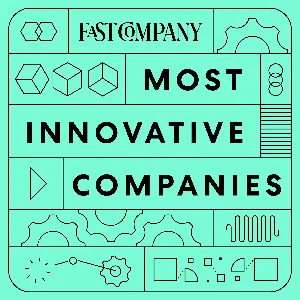Podcast Summary
AI integration in society and industries: AI is transforming industries, tackling issues, and creating opportunities for growth, privacy, and new jobs.
Artificial Intelligence (AI) and data science are becoming increasingly integral to various industries and society as a whole. While there are concerns about potential inequities, AI is also being used to tackle pressing issues like climate change and disinformation. Ryan McCormick, an equity product strategist at Invesco QQQ, highlights the prevalence of AI-enabled smartphones as a significant development, which could lead to faster devices, greater privacy, and potential shifts in marketing and advertising, as well as the creation of new jobs and economic growth opportunities.
AI and data science creating new jobs: Despite displacing 85 million jobs, AI and data science will create 97 million new jobs, particularly in healthcare, energy, and utilities, with significant growth in autonomous vehicles and traffic mitigation.
AI and data science are not job destroyers but rather creators, with new jobs emerging as technology advances. Despite the anticipation of 85 million jobs being displaced by AI by 2025, 97 million jobs are expected to be created. Industries underutilizing data science include healthcare, where digitization of records and medical research are crucial, and energy and utilities, which rely on AI for infrastructure monitoring. Looking ahead, autonomous vehicles and trucking, traffic mitigation, and predictive capabilities of AI in easing city traffic and improving roadway safety are some of the significant changes we can expect. From Sue's perspective, she has witnessed the transformative impacts of AI and data science in various sectors and anticipates continued adoption and growth.
Technology's Role in Mitigating Challenges and Creating Opportunities: Technology is revolutionizing industries, from enabling businesses to adapt to crises like COVID-19, to ensuring transparency and accountability in carbon offset markets through satellite images and AI.
Technology is revolutionizing various industries by providing solutions to new and existing challenges. In the context of the discussion, the COVID-19 pandemic led to an increased reliance on AI and big data analysis for businesses to mitigate customer concerns and adapt to new ways of operating. Meanwhile, in the realm of forestry preservation and restoration, the emerging market for carbon offsets is growing rapidly, and companies like Pachama are using satellite images and AI to ensure the effectiveness and transparency of these projects. By combining remote sensing data and machine learning algorithms, Pachama is enabling trust and accountability in the carbon offset market, making it an innovative player in this space. Overall, technology is enabling businesses to navigate challenges and create new opportunities, from improving customer engagement during crises to ensuring the integrity of carbon offset projects.
Using AI and satellite imagery to measure forest carbon sequestration: Advancements in satellite tech, AI, lidar, and cloud computing enable larger-scale, cost-effective forest carbon sequestration measurement, crucial for climate change mitigation. Pajama uses AI to correlate satellite features with ground data for predictive models.
Technological advancements in satellite imagery, artificial intelligence (AI), lidar technology, and cloud computing have recently converged, making it possible for companies like Pajama to accurately measure and predict carbon sequestration in forests at a larger scale and lower cost than before. This is crucial for effectively addressing climate change through forest carbon sequestration. Pajama's approach involves training AI algorithms to correlate features of satellite images with lidar data and carbon measurements on the ground to create predictive models for carbon sequestration in forests around the world. They are also exploring the use of drone data and sensors to expand their innovations. Despite the competition for AI talent in the tech industry, Pajama's mission to restore nature and solve climate change has attracted top engineering talent from leading tech companies.
From luggage to forests: Rafael's unexpected climate journey: Passion and determination can lead to unexpected climate solutions, even from industries unrelated to environmentalism. Long-term planning and thoughtful sequencing are also crucial.
Passion and innovation can lead individuals from unexpected industries to make a significant impact on climate change. Rafael, the founder of Pachama, started with a luggage company, Bluesmart, but realized the potential of the tools and techniques he used there to protect nature and combat climate change. However, the unexpected ban on lithium ion batteries in aviation forced him to close the company and take a sabbatical. During this time, he reflected on his experiences and learned that while it's important to move fast on experimentation and learning from customers, it's also crucial to move slow on things with long-term policy implications and to think thoughtfully about sequencing steps. Eventually, this led him to start Pachama, where he's now using technology to preserve forests and reduce carbon emissions. Despite setbacks, Rafael's journey shows that passion, determination, and a long-term perspective can lead to meaningful climate solutions.
Combating skepticism towards forestry offsets: Ensure data-driven accuracy, industry-wide accountability, and a commitment to learning from past mistakes to address concerns around forestry offsets.
Addressing the skepticism and concerns around the effectiveness and transparency of forestry offsets requires a combination of data-driven accuracy, industry-wide accountability, and a commitment to learning from past mistakes. The CEO of Pachama, who personally experienced the devastating impact of wildfires caused by climate change, emphasizes the importance of continuing to invest in nature-based solutions to mitigate climate change, while ensuring integrity, transparency, and accountability. Past issues in the market were due to a lack of data and misunderstood protocols, but bad actors were a small minority. It's crucial not to dismiss the potential of forest carbon projects entirely, as they play a vital role in funding conservation and restoration efforts. The future of nature-based solutions lies in a new generation of projects that prioritize data-driven accuracy, transparency, and accountability.
Supporting Corporate Carbon Offsetting Efforts: Companies investing in nature conservation and restoration should be encouraged and supported, but they must first measure and reduce their own emissions before purchasing carbon credits.
While there are issues with the current carbon offset market, such as underpricing and lack of transparency, it's important not to dismiss the efforts of companies investing in nature conservation and restoration as mere greenwashing. Instead, we should encourage and support these corporations, who have significant influence and resources, to make genuine investments in reducing their carbon footprint and transitioning to renewable energies. Pachama, a mission-driven company, welcomes conversations with companies at any stage of their journey towards carbon neutrality and net zero emissions. However, for companies making public claims of carbon neutrality or net zero, it's crucial that they first measure their carbon emissions and take necessary steps to reduce them before purchasing carbon credits. Pachama also offers guidance and connections to consulting firms and technology companies specializing in carbon accounting to help companies understand their footprint. Ultimately, the goal is to ensure that companies make meaningful contributions to carbon removal and not just rely on offsets as a substitute for addressing their own emissions.
Encouraging Big Oil to Invest in Nature Restoration and Decarbonization: Companies like Pachama are using software technologies to make forest carbon projects scalable and are exploring new opportunities in mangrove forest restoration. However, it's crucial to hold big oil accountable for their net-zero pledges and ensure they meet their goals at the current pace.
While it's important not to ostracize big oil companies and instead encourage them to invest in nature restoration and decarbonization, it's crucial to keep them accountable. Companies like Pachama are focusing on originating new forest carbon projects, particularly in reforestation, and are using software technologies to make these efforts scalable. Although this is new territory for Pachama, they are excited about the potential of mangrove forest projects and the challenge of collecting new data types. As for the net-zero pledges from companies, while optimism is necessary, there are valid concerns about their ability to meet these goals at the current pace. The discussion underscores the importance of collaboration, innovation, and accountability in addressing climate change.
Companies leading the way towards a sustainable future: Companies like Amazon, Microsoft, and Apple are investing in net zero goals, while Pachama uses technology to bring transparency to forestry offsets, emphasizing the importance of addressing challenges in the growing market.
Companies can undergo rapid transformations when there is a strong will from the board and management team. The COVID-19 pandemic serves as a prime example, as businesses had to adapt quickly to remote work and new business models. Companies like Amazon, Microsoft, and Apple, which have made significant pledges towards net zero goals, are leading the way in this regard. However, it's essential that the rest of the economy follows suit and makes serious investments in achieving net zero goals. Diego Saez-Gavas, the CEO of Pachama, emphasized the importance of transparency and addressing challenges in the growing forestry offset market. Pachama, which uses technology to bring more transparency to forestry offsets, is keeping these challenges in its sights as the market continues to grow rapidly. Overall, it's crucial that companies and the economy as a whole make meaningful investments towards a more sustainable future.



